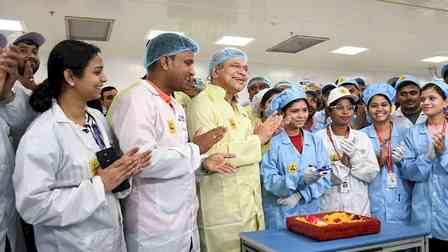Industry reactions on Union Budget (Part-5)

Kaushal Agarwal, Chairman, The Guardians Real Estate Advisory
“The union budget presented by the honourable finance minister, Smt Niramala Sitharaman emphasizes growth and comprehensive development with a view to enhancing citizen welfare. The government in this year’s budget has made allocations to expand infrastructure, healthcare, education, skilling, rural welfare, and digitalization. The government is investing heavily in capital expenditure to invigorate the Indian economy and create new job opportunities.
The central government has reduced taxes across all tax brackets, enabling the middle class to save more of their income. The increase in the income tax exemption rebate from Rs 5 lakhs to Rs 7 lakhs will benefit thousands of people by providing more disposable income in their hands. Lowering personal taxes will provide prospective homeowners with additional funds that they can put towards acquiring a home, which is a solid and reliable investment.
The government has reinforced its commitment to providing housing for all by substantially increasing the funding for the Pradhan Mantri Awas Yojana, from Rs 47,500 crores last year to Rs 79,000 crores in 2021-22. Through this initiative, the government aims to fill the gap between those without decent housing and those who do, by providing a better housing subsidy. This extra funding will help ensure that both urban and rural homes are built quickly and up to the required standards.
The government has also increased the total capital expenditure on infrastructure development by 33%, accounting for 3.3 percent of our GDP at Rs10 lakh crore. This will have a positive impact on the Indian industry and create employment opportunities.
The Centre has offered 50-year interest-free loans to state governments for another year, with a total expense of ₹1.3 lakh crore. This initiative will stimulate infrastructure development in each of the states and also help promote local industries.”
Anshuman Singh, Chairman & Managing Director, Stellar Value Chain Solutions
"The budget attempts to pave the way for a long-term and sustainable economic growth for the country. The expected economic growth is expected around 7% by maintaining macro-economic stability amid geopolitical developments and facilitating employment generation. New age technology adoption right down to the grassroot level, green energy transition along with infrastructure focus are some of the highlights of the budget.
Infrastructure is the foundation of any economic growth as it facilitates trade and commerce and the government's commitments towards this are clearly evident. This is the third consecutive year of the government’s investment in infrastructure. INR 10 lac crore has been earmarked which is up by 33%. The government is also offering interest free loans to states for infrastructure development. The proposal to develop transport infrastructure will develop critical linkages to facilitate multi-modal transportation, which is extremely critical.
Green initiatives coupled with EV infrastructure development working towards net zero emissions have a favourable impact on the logistics and supply chain industry as it helps the industry expand while still saving cost and most importantly keeping the environment green. The proposal to set up centres of excellence for artificial intelligence and introduce Pradhan Mantri Kaushal Vikas Yojana (PMKVY) 4.0 will not only help the economy leverage the power of youth but also set the stage for a large-scale rollout of smart logistics equipped with data-driven technologies.
With all the infrastructure investment, technology enablement initiatives, environment friendly focus and employment generation and consumption, India is poised for the next phase of growth in its endeavour to be a strong force to reckon with globally.''
Surojit Shome, Managing Director and CEO, DBS Bank India
“The Finance Minister has signalled the government’s intent to maintain stability, while encouraging balanced economic growth. The proposed policy reforms and increased capital infusion will provide an impetus to MSMEs and the start-up ecosystem. Coupled with the proposal to harness the power of Artificial Intelligence by setting up Centers of Excellence, this should help stay in sync with the latest innovations. It is also very encouraging to see the FM allocating more funds for transitioning to a more green and responsible economy.”
Rahul Varma Kalidindi, CEO, Akrivia HCM
“Union budget of 2023 – 24 underpins a fitting way forward for the Indian startups, amidst looming global macro-economic uncertainties. We acclaim the government’s take on the vitality that entrepreneurship holds for our country’s economic development. The announced taxation benefits, credit allowances, and other MSME-centric measures will further simplify the business environment, thus fostering an ‘Amrit-Kaal’ of Bharatpreneur-led innovation. On the other hand, MSMEs will be able to imbibe the talent spree incoming from the government’s welcome move of skilling lakhs of youths in the next 3 years under Pradhan Mantri Kaushal Vikas Yojna 4.0. At Akrivia HCM, we look forward to contributing to the ecosystem with a made in India, AI-enabled, all-comprehensive talent lifecycle management for these growth engines and large industry players for and beyond India.”
Vinod Gupta, Managing Director, Dollar Industries Limited
“It is heartening that Budget 2023 is a significant step towards making India one of the top economies of the world with trust on overall digitalisation and enhanced use of artificial intelligence. I welcome the relief to MSMEs which assures a boost to manufacturing and infrastructure development.”
Vikram Vuppala, CEO and Founder, NephroPlus
“The 157 new nursing colleges as part of medical colleges is a welcome move but not a needle mover. At the same time, the budget was highly anticipated and not too optimistic. Even the budget allocation for the healthcare service providers could have been better. Moreover, some long pending infrastructure status has not been given, indicating a clear oversight. On the other side, the health ministry has been allocated INR 89,155 CR, thereby indicating a nominal rise of 12% over the FY23 allocation. Further adjusting this for inflation is not a promising growth on health allocation. To compare, BRICS, excluding India, spend about 6.7% of GDP on healthcare while India spends less than 2%.”
Dr. Ajit Parulekar, Director of Goa Institute of Management (GIM),
"There might not be anything specific for B-school education in India but one highlight for me was the talk of the National Data Governance framework. Through this framework, it will allow us to get access to a lot of non-personal, anonymous data. Research-intensive institutions will benefit greatly from this because one of the biggest hurdles one needs to overcome during the conducting of research is the lack of data. Other than that, we at GIM, ensure that we contribute substantially towards a green planet so it is heartening to see that the outlay for energy transformation is sizeable and the Government's support towards battery storage.
Also specific to our healthcare management program, it is no secret that sickle cell anemia has been a challenge in the country. In the past the government has done a lot of work toward combatting tuberculosis in the country and now, they have announced a mission to eliminate sickle cell anemia. They plan on doing a screening of more than 7 crore patients.
After a long time, there have been revisions in the tax regime. Under the new regime, there is a sizable up for the taxpayers. There continues to be a focus on infrastructure. This year we have the highest-ever budget for railways and the government is also looking at ramping up air infrastructure.
The only disappointment is that even though there is an increase in the budget for healthcare and education. It is marginal. We've been talking about increasing the healthcare budget to 4% for a long time and it's still at 2.1%. The education budget was 2.8% and it was 2.9%. It's very low for a country that aims to grow fast. We are underspending on healthcare and education by a very large margin."
Nirav Dalal, Executive Vice President- Business Development and Chief Investment Officer, Shapoorji Pallonji Real Estate
"We welcome the measures announced by Finance Minister Smt. Nirmala Sitharaman in the Union Budget 2023–24, which indirectly aims to boost the real estate sector's growth while also providing relief to consumers. The proposed increase in the income tax exemption limit to Rs 7 lakh will help boost real estate investment. This tax break will encourage homebuyers to invest more while simultaneously increasing revenue. Meeting the long-standing demand of the real estate sector, the cap deduction for capital gains on residential housing investment is set at INR 10 crore, which will undoubtedly benefit the real estate industry. As one of the important measures to support the market, there has been a 66% increase in the allocation to 79,000 crores in the Affordable Housing Fund (PMAY). The budget also has an emphasis on developing smart cities. The budget has allocated the Urban Infrastructure Development Fund (UIDF), which will be managed by the National Housing Bank and will be used by public agencies to create urban infrastructure in Tier 2 and Tier 3 cities. The infrastructural development in these untapped markets will help the development of real estate here."
Samyak Jain, Director, Siddha Group
“Budget 2023, rolled out by our Hon’ble Finance Minister, Smt Nirmala Sitharaman, has many positives for the Real Estate Industry.
An increase of 66% in the Prime Minister Awas Yojana (PMAY) fund outlay is a step in the right direction, which will not only enhance funding to the lower and affordable housing category, but also is in line with the Government's ‘Housing for All’ policy.
The enhanced capital expenditure of 10 lakh crore for Infrastructure Development will also help fast track implementation of high-multiplier Government Infrastructure programmes within the country; thus supporting the Housing Sector in a big way. Additionally, the proposal to invite more Private Investment participation in Infra Development will pave way in creating better Infrastructure and improving the housing stock.
We are also very happy to note that the First-Time Home Buyers will now be able to better plan to purchase their First Dream Home, as there will be additional savings due to the increase in Income Tax rebate limit from Rs 5 lakh to Rs 7 Lakh in the new tax regime.
The Government’s Fiscal Support in increasing Digital Payments will also bring in further transparency in real estate dealings.”
Himanshu Jain, VP - Sales, Marketing & CRM, Satellite Developers Private Limited (SDPL)
“The Union Budget 2023-24 continued the government’s focus on the India growth story. The government’s decision to increase the PMAY Fund by 66% to Rs. 79000 crores will be a big boost for affordable housing and is a step in the right direction to achieve the government’s vision of ‘Housing for All’. The Government's continuous efforts to promote affordable housing to the masses will overall give a boost to the real estate sector in the long term. This budget has again focused heavily on infrastructure that will directly impact development of housing and increased demand especially in the Tier II & Tier III cities.
The increase in rebate limit to 7 lakh from 5 lakh in the new tax regime will prove to be a boon for first time home buyers. This additional savings will help them to invest in buying a property and fulfilling their dream of owning a home of their own.”
Dr. Sachin Chopda, Managing Director, Pushpam Group
“The Urban Infra Development fund (UIDF) proposed investment of Rs 10,000 crore to create infrastructure development in tier II and tier III cities will encourage home buyers to move away from metro cities and seek housing in less congested areas. Peripheral areas outside major cities will also be looked at by home buyers who plan to live there or use it as a second home or simply invest in property and earn rental income from their investment.
The announcement of 50 tourist destinations to be selected through challenge mode and developed as a whole package for domestic and international tourism is a welcome initiative by the government. This has the potential to transform the area from a tourist destination into a second home or weekend getaway. This will help in offering job opportunities for the local people, developing the infrastructure, and improving the lifestyle of the people.
In its fervent attempt to make housing available to a larger section of people, the government has increased the rebate limit from 5 lakhs to 7 lakhs. These savings can spur investments in the real estate sector.”
Bhushan Nemlekar – Sumit Woods Limited
“The real estate sector was eagerly looking forward to the Union Budget 2023-24 hoping for incentives and several rebates. Although the focus of the Union Budget 2022 was on overall economic development, the only thing to cheer for the real estate industry was the increase in outlay for PM Awas Yojana by 66% to over Rs 79,000 crore. This is expected to further boost the government's programme to provide housing to the urban poor.
We are also pleased that the government has recognized infrastructure and investment as one of the 7 priorities that the budget is based on. The 33% higher capital outlay of Rs 10 lakh crore on infrastructure development will lay a foundation for Tier 2 & Tier 3 cities to transform into centres of economic growth.
There were heavy expectations for tax deductions and the increase in income rebate limit to Rs 7 lakh from Rs 5 lakh in new tax regime will encourage homebuyers to invest in real estate boosting the overall demand.
It is undoubtedly a progressive budget especially with its emphasis on economic growth and building infrastructure for the country.”


 City Air News
City Air News 









